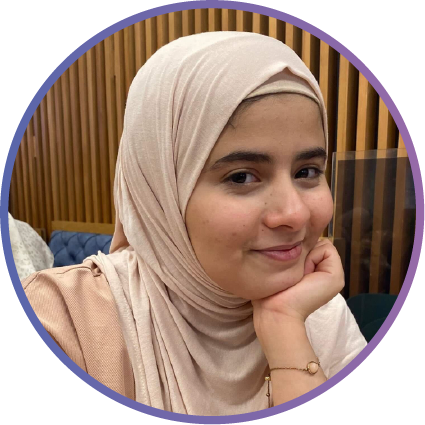As part of our “Building Resilient Multicultural Teams for the Future of Work” blog series, we asked Sara Khermane and Xuefei Cheng, coordinators of the Arabic and Chinese teams, to share their insights on cultural awareness and language diversity. Sara and Xuefei revealed how their teams navigate language barriers, promote cultural understanding, and address potential conflicts arising from cultural differences. They emphasized the importance of using simple and clear language and the power of an emoji 😊. Read on to discover more!
How does your team handle language barriers and ensure effective communication in daily operations?
SARA: When I started this job, my older sister gave me an interesting and relevant piece of advice, the gist of which was: you’re part of a team with people from all over the world and you never know how the things you say might come across. Since then, this has always been at the forefront of my mind. In my work, I try to use simple and clear language. Some teams communicate pragmatically and directly, while others like to communicate with a bit of warmth. It’s helpful to know a little bit about the person you are communicating with and their culture to help you understand why they might communicate a certain way.
XUEFEI: I have three mantras: always be kind, polite, and mindful; put yourself in the other person’s shoes; and show respect and effort.

While communication styles can vary from one culture to another, there are universal languages that all cultures can understand, such as kind smiles and the positive vibes in the tones, words, and expressions we choose. In everyday communication, we constantly remind ourselves to be mindful of the team’s multicultural nature and to use kind and polite words. One tool we found particularly useful is the large selection of emojis on our daily communication tools. 😊
Few people can be experts in all cultures. And we are all constantly learning from each other. What matters is that we show respect and that we are making an effort to learn about other languages and cultures. We also try our best to put ourselves in the other person’s shoes and often do necessary research and ask questions when we are uncertain about cultural norms in our daily communication. For example, when providing feedback about Chinese images and videos, we try to add details and visual references to help our colleagues understand what we want to achieve.
Can you discuss any challenges your team has faced due to cultural differences in approaches to work or problem-solving?
SARA: One thing that stands out in my mind is how people from different cultures approach relationships and conversations. In some countries and cultures, joking around and being very friendly with a coworker you barely know is normal and even to be expected, while in others that kind of familiarity is a huge no-no and might make the person on the receiving end feel uncomfortable to the point that they shut down. Until you establish a good and familiar relationship with them, that is. Keeping an open mind can really help foster understanding and appreciation, especially when you are the person who is super friendly but the other party is not so welcoming. Understanding that this is not the norm for them and respecting that boundary will help you take things a lot less personally and instead work towards interacting with the person on their level. If we fail to recognize cultural differences, we can misinterpret reactions as rejection, and we all know how much rejection stings! When you feel rejected, you may turn away from the person completely and not attempt to build a relationship with them, which, if you ask me, is a missed opportunity to connect with people. So, stay open.
XUEFEI: The Chinese communication style is more reserved compared with many other cultures. And this means that sometimes team members might refrain from sharing their thoughts to avoid potential “conflicts,” which may keep people from sharing brilliant ideas. To avoid this, it’s important for me to be aware of this and encourage everyone to speak up in team discussions. When discussing crucial topics, I try to make sure everyone has spoken before moving forward.
From your perspective, how does Team Q ensure that everyone feels valued and respected, regardless of their cultural or linguistic background?

SARA: I think the feeling of being valued and respected is something that we build with the little things. What I mean by that is when we do our work, there is a unified sense of cooperation that runs through the whole team. Everyone clearly wants to help everyone else out, and that really solidifies a sense of belonging in the team and a sort of reassurance. I feel very comfortable asking for help and direction from my teammates, and that is because we have a solid foundation of respect and inclusion.
XUEFEI: We have weekly syncs to make sure everybody on the team is aware of what’s going on in all projects we work with, and we ensure that everyone has the knowledge and skills needed to cover all types of tasks. It’s particularly important to mention all the Chinese team members are living far away from where we are originally from, and that makes going back home a bigger deal for us in terms of time and money. To accommodate the team’s needs, everyone works hard to make sure we can cover for each other when necessary.
How do you address potential misunderstandings or conflicts arising from differences in communication styles or cultural norms?
SARA: The first step would be to make sure a sincere apology is made to whoever has been wronged. It can be argued that an apology may not be necessary since misunderstandings are just that, a lack of understanding and not a product of bad will; however, beginning the conversation with an apology is a great way to start moving towards de-escalation.

Humor plays a huge role in Arab speaking cultures. Usually, Arabs tend to be warm and fun people to be around, so humor is employed at every turn, sometimes even in serious situations, and it helps de-escalate tensions. We share our differences and even laugh at them in goodwill. I would say humor is even paramount in the Arabic team, specifically because we all understand how it is used and that it is a normalized communication tool. However, we are careful not to overuse it outside of the Arabic team because, again, not all cultures would react to it the same way.
XUEFEI: I always resort to timely and honest communication. I think the most important things when it comes to multicultural communication are awareness and openness. When I realize someone might have misunderstood me, I often reach out to explain my intention and apologize if I have offended anyone. And when I feel like I might be in the middle of conflict and misunderstanding, I remind myself to take a closer look and be aware of communication style differences before taking offense. Our goal is to complete the work while keeping everyone’s morale high. I have faith that all communication stemming from goodwill can be effective in a work environment where everyone is constantly learning about and from each other.
Can you share examples of how cultural diversity enriches your team’s localization process?
SARA: Within the Arabic team, all of us come from different countries: Algeria, Syria, Egypt and Jordan. And although Arabs have many things in common, they also have so many differences and are extremely culturally diverse. Our dialects are very unique, so much so that there are times we don’t understand each other. This has helped us when brainstorming transcreations. Sharing how concepts are explored in our dialects sometimes helps us come up with fun and clever localizations. This is especially relevant for our language since Arabic is commonly spoken in dialects, but the form we use in localization is called MSA (Modern Standard Arabic), which is more prevalent in academic and formal circles rather than in day-to-day life. It is hard to get it out of that context and make it fun, so having our dialects as a reference sometimes helps. This does not mean we use our dialects in localization, but rather, we use them as inspiration and reformulate the language to fit MSA standards.
Can you describe any initiatives or activities your team has implemented to celebrate cultural diversity and promote cross-cultural understanding?

XUEFEI: When the workload allows, we host coffee hours for all team members to share our experience with diverse cultures. Among us, two are based in the United States, one is based in France, and two are based in UK. During those meetings, we talk about our own cross-cultural experiences and learn about the cultures we are currently living in. One more thing worth mentioning is that, even though we are all native Chinese speakers, we are from different regions within China that have unique customs, diets, and dialects. For me, it’s an enriching experience because I get to learn about cultural differences at both the national and global levels.
How do you promote cultural understanding and appreciation among team members from different backgrounds?
SARA: I think a huge part of this is quite a simple concept: keep an open mind. This sounds very basic, but it is one of those basic pieces of advice you get but don’t recognize the importance of until you internalize it and use it. It’s important to understand that the individuals you deal with come from different countries, cultures, religions, and lifestyles, so whatever sticks out to you as unusual should be treated with respect. When you have this mindset from the onset and you keep your mind open, it is much easier to begin to not only understand others but appreciate their otherness. I, for one, love existing in a space where people are so different from me. It’s like a breath of fresh air and a yummy cool lemonade on a hot summer day! Developing a sense of curiosity makes this even more fun and engaging and takes you beyond just understanding to enjoying.
XUEFEI: To be honest, we haven’t done much about this, but recently a team member mentioned how cool it would be if we could learn ten words from each other’s languages. And I thought it could be a great initiative! We might try it within the Chinese team with the different dialects we speak.
In what ways do you encourage team members to share and celebrate their cultural traditions and holidays, especially those related to your cultures?

XUEFEI: One thing we do is greet each other in Chinese on traditional Chinese holidays. We all have family and friends back in China who celebrate and enjoy these holidays, and when we greet each other on these days, it makes me feel closer to home and reminds me that the whole team is connected culturally despite the various locations we are currently in. We also discuss some of the challenges of living abroad, like how to properly feed ourselves when ingredients we are familiar with are not as easily accessible in the countries we are living in.
SARA: I think encouragement can be best achieved by being the person to take the initiative, asking how each person celebrates these traditions and events, as they are celebrated differently across countries. This usually creates a snowball effect, and everyone is encouraged to join in and share. Since we are a remote team, we are, for the most part, limited to just that. Another variation is that we sometimes send pictures of these events, when possible, and it is always incredibly nice to see everyone’s reaction. It’s a great idea to stay open to being asked questions about these holidays and make sure to answer in a welcoming and inviting way.
When you feel like your culture is respected and even appreciated, this alone encourages you to share about it naturally. So, I guess making sure the sharing party knows what they are sharing and talking about is respected and appreciated can help encourage them to do just that tenfold!

Sara Khermane is a Localization Quality Assurance Tester specializing in the video game industry. She holds both a Bachelor’s and a Master’s degree in Translation and Interpretation, with a focus on Arabic, English, and French. Within two years of joining Terra Localizations, Sara was promoted to Coordinator, overseeing the Arabic LQA team and fostering a collaborative environment.

Xuefei Cheng is a professional in translation, localization, and language services. She holds a Bachelor’s in Law and a Master’s in Translation and Interpretation. Xuefei is enthusiastic about languages, literature, and video games and is dedicated to helping people connect through these media. As a Coordinator at Terra Localizations, she provides support to the Chinese LQAs and helps clients achieve project milestones.
